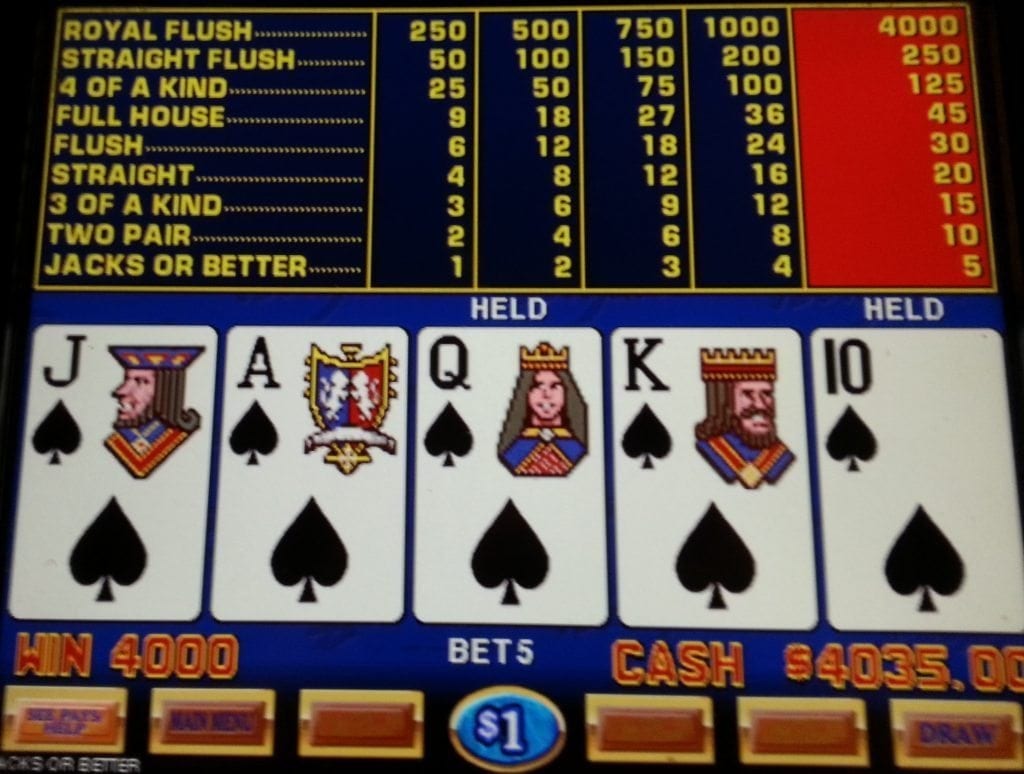Who Would Have Better Results?
Also read part 1 of this article “Why Don’t Straight Flushes Pay More?“
I’ve asked the question presented below to probably 5,000 people at my various “Secrets of a Video Poker Winner” classes over the years. Somewhat less than half of the listeners get the answer correct and the rest don’t. Surprisingly, everybody seems to think the question is extremely simple — even though more than half of all listeners miss it! I’ve come to the conclusion that people who actually know how to win at gambling will ALL get the correct answer. People, however, who THINK they know how to win, but whose results don’t reflect that yet, seem to mostly get the wrong answer.

Stan & Pearl
Consider my imaginary friends Stan and Pearl, who are far more disciplined than any players you have ever met. Every night they go into a casino with no slot club and play ten hands of 9/6 Jacks or Better — a game that returns 99.5% when mastered. At the end of the ten hands, Stan stops. He quits and goes home for the night.
Pearl, however, “parlays”. This is a term that can mean several things, but I am using it here to mean that she invests her winnings when she gets ahead. If during her ten hands Pearl connects on a flush or higher, she’ll play another five hands. If during those five hands she again connects on a flush or higher, she’ll play another five hands. She’ll keep doing this until she eventually runs into a five-hand dry spell, and then she’ll go home. Stan stops and Pearl parlays. They do this every night for a year.
My question is:
At the end of a year, whose results are likely to be better?
Before reading on, I strongly suggest you choose for yourself. I’ll be glad to wait.
Most people usually like Pearls chances better. I ask the people who choose Pearl why? I usually get some combination of the following:
a. She’s betting more when she’s found a hot machine. And when the machine turns cold, she quits.
b. She’s playing with the house money.
c. She’s playing so that when luck comes her way, she can take advantage of it.
All of these reasons are perfectly understandable, and fit in well with what most people think it takes to be a winning player. Unfortunately, Pearl is without doubt the wrong answer and each of these reasons is total nonsense.
Players who know what it takes to win look at the number 99.5% and realize instantly that the casino has a half-percent advantage. Winning players know that nobody can win over time when the casino has the edge. The correct conclusion is that whoever bets the least amount under these conditions will lose the least. Stan bets less, so on average he will lose less. Pearl bets more, so on average she will lose more.
Now let’s move Stan and Pearl to a casino with a slot club that returns 1% cash back. This is higher than you usually find in the real world, but it makes the math easier to understand. As before, Stan plays ten hands and stops while Pearl parlays her winnings. Who do you like now?
By now you should know that Pearl is the one to bet on because you add the 99.5% the game is worth to the 1% the slot club pays and you get 100.5%. They’re playing a game where the player has the advantage, and so now whoever bets more wins more on average.
You’ve probably heard that you should “Quit while you’re ahead”. You’ve also probably heard that you should “Bet more when you’re winning.” They actually provide contradictory advice. One says that when you get ahead you should BET, BET, BET, and the other says then when you get ahead you should QUIT, QUIT, QUIT. Since they are contradictory, it is impossible for both sets of advice to be correct. But it is possible for them both to be wrong. And I think they are.
The secret to winning is to bet when you have the advantage. And when the house has the advantage, don’t bet. That’s it. Follow that, and I like your chances of ending up a winner in the long run. Ignore it, and I like the chances of casinos expanding and continuing to send you welcome letters.

Do you need to be good at math to succeed at video poker?
One of my students told me she had never liked mathematics or been particularly good at it. She asked me if that would hinder her success at video poker. After considering this question at some length, I told her that I believed that mathematically-challenged players rarely get very good at video poker.
This answer surprised both of us. After all, the math at video poker isn’t very difficult. But it’s a winning player’s constant companion. Let me give some examples of how I use numbers regularly:
- Pay schedules are important. The difference between receiving 9 per coin for a flush compared to 8 per coin is worth $30 an hour or so when playing for dollars. Noticing this difference isn’t difficult, but it is important.
- Each game has an optimal return. To decide which game to play you need to know the returns of the top two or three games at each of the casinos you frequent. Using Video Poker for Winners or other software to figure this out is easy enough, and it’s acceptable to write down these numbers and take the list with you, but you need to have this information at your fingertips.
- Each slot club has a different amount of cash back. Casinos rarely tell you that their club returns a half percent. What they tell you is that it takes $5 to earn a point and for every thousand points they’ll give you $25 in cash. Can you determine whether that gives you an advantage if you are playing a game that returns 99.73% to start with?
- If four sevens pay an extra 100 coins, can you figure out what that adds to 8/5 Bonus Poker? How much is a 4000-coin bonus for a royal in diamonds worth? Is that worth more or less than double points at the casino next door?
- If you get a scratcher for every 4-of-a-kind, and figure each scratcher is worth $2 on average, can you determine what that adds to the game?
- If the casino doesn’t offer cash back, but will send you six bounceback checks for $50 if you play $80,000 per month, can you determine how much that is worth and figure out how much play it will require?
- One casino is giving away a car and another is giving away $25,000 in cash — and the drawings are at the same time. Can you read the rules and figure out which of the two provides you with a better opportunity?
- On progressives, can you figure out how high a royal on 9/7 Double Bonus Poker has to be before the game returns 100%
You get the idea. Using simple math is very important to determine WHICH GAME is best to play NOW. If you ALWAYS play one particular machine at one particular casino you don’t need to worry about these things, but players who do this are rarely winners. Casinos are always competing with each other trying to get you to come in and play. Sometimes one casino offers the best deal. Sometimes it’s another casino. Figuring out which casino offers the best play this week is part of the game.
My experience is that players who are good at math make these calculations almost subconsciously. It isn’t that difficult to put things into numerical context if that is your frame of reference. Players who aren’t good at math tend to avoid these calculations altogether. In general, people who aren’t good at something tend to rationalize that being good at it isn’t important.
Can someone who hasn’t been very good at math turn it around and become good at video poker? Of course. But it will require a sustained effort. How badly do you want to win?
Also read part 1 of this article “Why Don’t Straight Flushes Pay More?“
Photo credit: Poker Chips @ MobileAdvertisingWatch
Bob Dancer is the premier video poker writer and teacher in the world. He has created a number of how-to-win products available at bobdancer.com. He co-hosts a weekly radio show called Gambling with an Edge, which is also archived on his website. (The show is also available on iTunes.)
Bob Dancer is the premier video poker writer and teacher in the world. He has created a number of how-to-win products available at bobdancer.com. He co-hosts a weekly radio show called Gambling with an Edge, which is also archived on his website.













